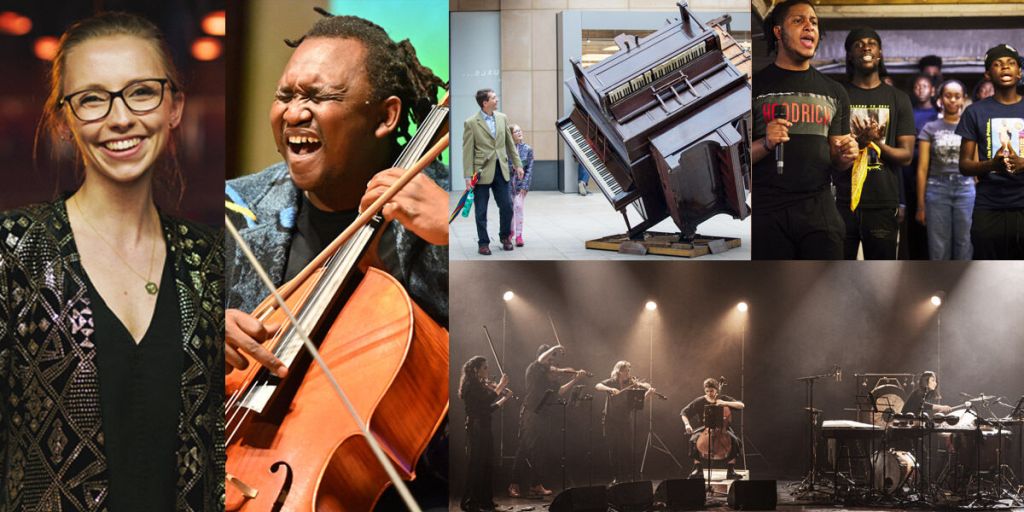
Manchester Collective [names not given in the programme but assumed to be Rakhi Singh (violin, director), Jonathan Martindale (violin), Alex Mitchell (viola), Christian Elliott (cello)]
Mason Muttos from Sardinian Songbook
Finnis String Quartet no.2
Wallen Five Postcards
Campbell 3AM
Mason Eki Attar from Tuvan Songbook
Tabakova Insight
Hamilton In Beautiful May
Glass String Quartet no.4 ‘Buczak’ (2nd movement)
Meredith Tuggemo
Wigmore Hall, London
Wednesday 25 September 2024
Reviewed by Ben Hogwood
This inspiring concert, the first in a series presented by the enterprising team at the Performing Rights Society (PRS), revealed the innovation afoot even in the most traditional classical music forms. The string quartet has been an established medium for close on 300 years, but the four players assembled by the Manchester Collective showed where future possibilities lie.
Christian Mason’s work reproduces throat singing for the medium, often with vocal contributions from the players themselves – and the Collective’s performances of Muttos and Eki Attar were gripping and rhythmically vital.
Grabbing the attention in a very different way were quieter works by Edmund Finnis and Jocelyn Campbell. The former’s String Quartet no.2 inhabited the rarefied atmosphere that Finnis seems able to conjure at will, with interlocking phrases and melodies given an unexpectedly tender accent. The Manchester Collective played with beautiful sonority, enhanced by microphones – which in the case of Jocelyn Campbell’s 3AM was an asset, portraying the streets of London in the hour of the day where they are at their most deserted. The slights of hand, the nocturnal rustlings, the shadows we couldn’t quite make out – all were beautifully rendered and sculpted by a composer whose painting in sound is uncommonly vivid.
This was before the elephant in the room – Andrew Hamilton’s In Beautiful May – was dealt with. A piece for solo violin and electronics, it was delivered with great virtuosity by Rakhi Singh, who warned us ahead of the performance that it would be a ‘marmite’ piece. She was absolutely right, playing music that was definitely not for everyone’s enjoyment – and certainly not this reviewer. Hamilton’s collage of jarring violin phrases and pop song snippets meant we jumped between Singh and snatches of Shalamar’s I Can Make You Feel Good, Take That’s Back For Good and Will Young’s Evergreen. The short attention span of the music was infuriating, its cut and paste approach chopping the music into small bits and spitting it against an unforgiving wall. Yet personal feelings should be qualified, as Hamilton’s piece got one of the strongest reactions of the night!
Perhaps surprisingly the second movement from Philip Glass’s String Quartet no.4, Buczak, provided some much-needed balm, with an elegance not normally associated with the American composer. The Manchester Collective gave a beautiful legato performance allowing time for reflection.
Meanwhile Dobrinka Tabakova’s Insight made a strong impression, its folk melodies and rhythms winningly played and melded into an extremely convincing whole, offering further proof of the Bulgarian composer’s assured and compelling writing for strings in particular.
Errollyn Wallen’s Five Postcards, for violin and viola, were given a brilliant performance by Singh and Alex Mitchell. These were a lot of fun, ranging from bluesy musical chats to intimate asides, and a reminder that the combination of violin and viola – used so effectively by Mozart but surprisingly few composers since – is well worth revisiting.
Finishing the concert was Tuggemo by Anna Meredith, using the old English word for a swarm of birds or flies. It made for a suitably hedonistic note on which to finish the concert, with its driving four to the floor beat and jagged quartet riffing. While meant to be loud, the beat swamped the quartet on this occasion, its ultimate destination the middle of a dancefloor before the piece broke off and left us hanging.
This was, however, another example of Manchester Collective’s remarkable virtuosity and further evidence of their clever programming. Both elements combined to make this a memorable and highly stimulating concert.
Published post no.2,313 – 26 September 2024

